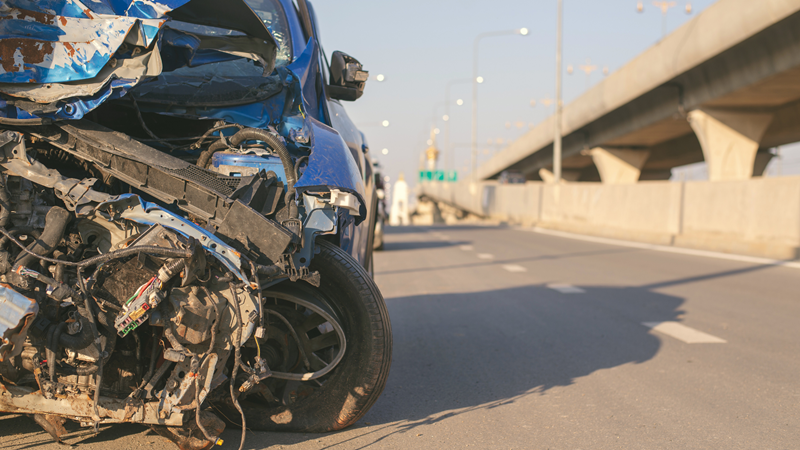
Texting while driving is a dangerous behavior that significantly increases the likelihood of accidents and, consequently, legal repercussions. In Illinois, where distracted driving laws are strictly enforced, engaging in this practice can lead to severe consequences, including lawsuits.
As an experienced personal injury attorney at the Law Office of Jack M. Shapiro, P.C., in Buffalo Grove, Illinois, I can help you understand how texting while driving heightens the risk of civil litigation in Illinois, getting into the laws involved, the nature of lawsuits, the role of evidence, and the broader implications for drivers.
The Dangers of Texting While Driving
Texting while driving is a form of distracted driving that diverts a driver’s attention from the road. According to the National Highway Traffic Safety Administration (NHTSA), sending or reading a text takes a driver’s eyes off the road for an average of 5 seconds, equivalent to driving the length of a football field at 55 mph without looking.
This momentary lapse can result in collisions, injuries, and fatalities. In Illinois, the dangers are well-documented. The Illinois Department of Transportation reported that in 2022, distracted driving contributed to over 14,000 crashes, with mobile device use being a leading factor.
These accidents often result in property damage, bodily harm, or death, creating grounds for legal action against the at-fault driver.
Illinois Laws on Texting While Driving
Illinois has stringent laws prohibiting texting while driving, reflecting the state’s commitment to road safety.
Under the Illinois Vehicle Code (625 ILCS 5/12-610.2), it’s illegal to use a handheld electronic communication device, such as a cellphone, to compose, send, or read text messages, emails, or other electronic communications while operating a motor vehicle.
This law applies to all drivers, with limited exceptions (e.g., using hands-free devices or reporting emergencies).
Violations carry significant penalties:
A first offense results in a fine of up to $75.
Subsequent offenses increase fines and may lead to license suspension.
If texting while driving causes an accident resulting in great bodily harm or death, the driver may face felony charges, including aggravated use of an electronic communication device, with penalties of up to 7 years in prison.
These laws establish a clear standard of care for drivers. Violating them not only results in criminal penalties but also serves as evidence of negligence in civil lawsuits, increasing the likelihood of liability. For a better understanding of these laws, contact a personal injury attorney.
Negligence and Civil Liability
In Illinois, most lawsuits arising from texting while driving are based on the legal principle of negligence. To succeed in a negligence lawsuit, the plaintiff (the injured party) must prove four elements:
Duty of Care: The defendant (the driver) had a legal obligation to drive safely and avoid harming others.
Breach of Duty: The defendant failed to uphold this obligation by texting while driving.
Causation: The defendant’s actions directly caused the accident and the plaintiff’s injuries.
Damages: The plaintiff suffered actual harm, such as physical injuries, medical expenses, or property damage.
Texting while driving is a clear breach of the duty of care. Illinois courts recognize that drivers must remain attentive to the road, and engaging in distracting activities like texting violates this obligation.
When an accident occurs, the plaintiff’s attorney will argue that the driver’s texting was the proximate cause of the crash, making the driver liable for resulting damages. Contacting a personal injury attorney quickly can help reduce the risk of a lawsuit taking shape.
Types of Lawsuits
Texting while driving can lead to various types of lawsuits in Illinois, depending on the circumstances of the accident. The most common include:
Personal Injury Lawsuits
If a driver’s texting causes an accident that injures another person, the victim may file a personal injury lawsuit. These lawsuits seek compensation for:
Medical expenses (e.g., hospital bills, rehabilitation costs)
Lost wages due to inability to work
Pain and suffering
Emotional distress
For example, if a texting driver rear-ends another vehicle, causing whiplash or a traumatic brain injury, the injured party may sue for both economic and non-economic damages.
Illinois follows a modified comparative negligence rule, meaning the plaintiff can recover damages only if they’re less than 50% at fault for the accident. However, any recovery is reduced by the plaintiff’s percentage of fault. A personal injury attorney can help you understand the lawsuit process.
Wrongful Death Lawsuits
If texting while driving results in a fatal accident, the deceased’s family may file a wrongful death lawsuit under the Illinois Wrongful Death Act (740 ILCS 180/). These lawsuits seek compensation for:
Loss of financial support
Loss of companionship
Funeral and burial expenses
For instance, if a driver texting at a red light fails to stop and strikes a pedestrian, causing their death, the victim’s family could pursue a wrongful death claim. The fact that the driver was texting strengthens the case by demonstrating reckless or negligent behavior.
Property Damage Lawsuits
Even in accidents without injuries, texting while driving can lead to lawsuits for property damage. If a driver’s distraction causes a collision that damages another vehicle, the vehicle’s owner may sue to recover repair or replacement costs.
While these lawsuits typically involve lower stakes than personal injury or wrongful death claims, they still impose financial and legal burdens on the at-fault driver.
The Impact of Evidence in Lawsuits
Proving that a driver was texting at the time of an accident is critical to a successful lawsuit. In Illinois, plaintiffs can use various types of evidence to establish liability:
Phone Records
Cellphone records are a powerful tool in distracted driving lawsuits. Attorneys can subpoena a driver’s phone records to determine whether they were sending or receiving texts at the time of the accident. Timestamped data showing text activity seconds before a crash can be compelling evidence of negligence.
Witness Testimony
Eyewitnesses who saw the driver using their phone can provide valuable testimony. For example, another driver or a pedestrian who observed the at-fault driver looking down at their phone can corroborate the plaintiff’s claims.
Police Reports
If law enforcement responds to the accident, the police report may note evidence of distracted driving, such as an admission by the driver or visible phone use. In Illinois, officers are trained to investigate whether electronic devices contributed to a crash, and their findings can support a lawsuit.
Traffic Camera Footage
In urban areas like Chicago, traffic cameras may capture footage of the accident, including the driver’s behavior. Video evidence showing a driver holding a phone or looking away from the road can be decisive in court.
Expert Testimony
In complicated cases, plaintiffs may hire accident reconstruction experts to analyze the crash. These experts can use data such as vehicle speed, braking patterns, and phone records to demonstrate that texting caused the accident.
The availability of such evidence makes it easier for plaintiffs to build a strong case, increasing the likelihood that a texting driver will face a lawsuit and be found liable.
Punitive Damages and Texting While Driving
In addition to compensatory damages (e.g., medical bills, lost wages), Illinois courts may award punitive damages in cases involving egregious conduct.
Texting while driving can be considered reckless or willful misconduct, especially if the driver was aware of the risks but chose to text anyway. Punitive damages are intended to punish the defendant and deter similar behavior in the future.
For example, if a driver with a history of texting-related violations causes a serious accident, the court may impose punitive damages to send a message about the dangers of distracted driving. These damages can significantly increase the financial burden on the defendant, making lawsuits even more costly.
Insurance Implications
Texting while driving also affects insurance coverage, which can complicate lawsuits. In Illinois, drivers are required to carry liability insurance to cover damages caused by their negligence. If a texting driver causes an accident, their insurance company may be responsible for paying damages up to the policy’s limits.
However, insurance companies may attempt to limit their liability by arguing that the driver’s actions were intentional or reckless, potentially voiding coverage. Additionally, a history of texting-related violations can lead to higher premiums or policy cancellation, leaving the driver personally responsible for lawsuit costs.
If the damages exceed the driver’s insurance limits, the plaintiff may pursue the driver’s personal assets, such as savings or property. This risk underscores the financial exposure faced by drivers who text behind the wheel.
Contact a Personal Injury Attorney
As Illinois continues to prioritize road safety, drivers must recognize the serious consequences of texting behind the wheel. At my firm, we serve clients throughout Arlington Heights, DuPage County, Lake County, Mount Prospect, Palatine, Vernon Hills, Mundelein, Cook County, Hoffman Estates, McHenry County, Northbrook, Schaumburg, and Wheeling. Contact me as your personal injury attorney at the Law Office of Jack M. Shapiro, P.C. for assistance.



